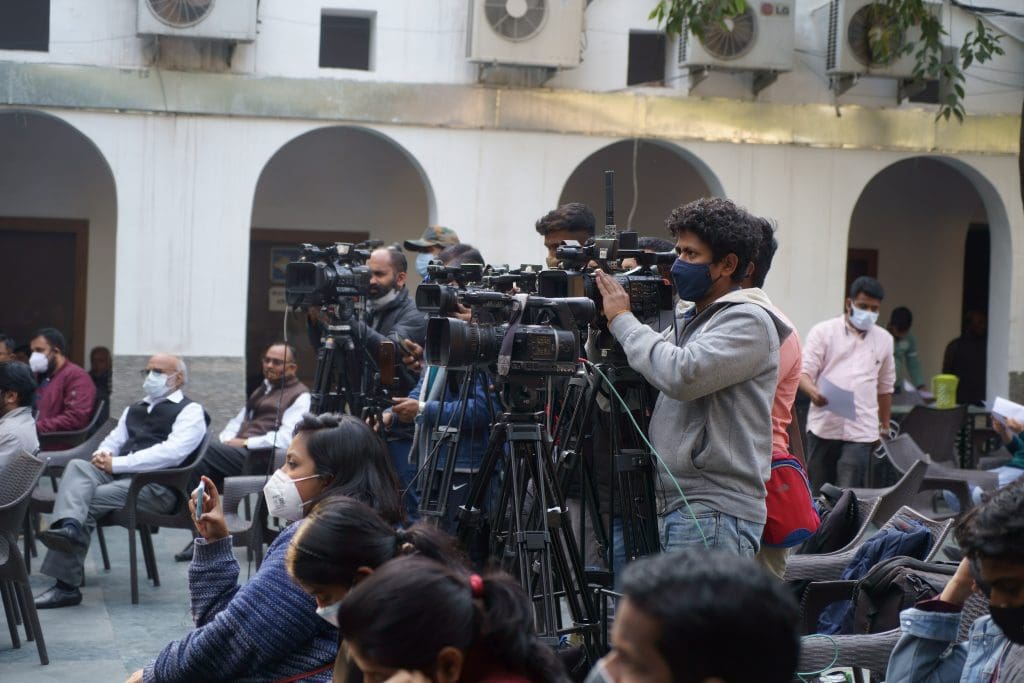
On Friday, a group of 30 correspondents of international publications in India wrote an open letter highlighting the case of Vanessa Dougnac, a French journalist presently facing a cancellation notice of her OCI Card by the MHA over her alleged biased reporting and visa violations.
A French national, Vanessa Dougnac has been living in India for the past 22 years as a journalist and a wife to an Indian citizen. Writing in her native language, she is known for her works in French publications Le Point and La Croix, along with Swiss and Belgian daily newspapers Le Soir and Le Temps. On January 18, Vanessa encountered a notice issued by the Foreigner’s Registration Office of the MHA accusing her of creating a “biased and negative perception about India” through her reportage and “undertaking journalistic activities without any special permission as required under Citizenship Act 1955”.
First reported by The Print, the article did not disclose the journalist’s name. However, Dougnac, in a public statement confirmed receiving the notice and further denied the allegations against her.
“I can confirm that I have received a notice from the concerned department of the Government of India and that I deny all the allegations and imputations made therein against me and my conduct.” Asserting dissent over the allegations, she stated, “India is my home, a country which I deeply love and respect, and I have never engaged in any acts that are in any manner prejudicial to Indian interests as is being alleged.”
This action was taken up before French President Emmanuel Macron visited India, where he was scheduled to be the chief guest at New Delhi’s Republic Day celebrations. Vanessa has been given until 02 February, thus, a 15-day timeline to respond, failing which she risks losing her OCI status and further being expelled from the country; to return, she would have to reapply for a visa.
“As the legal process is ongoing and the issues are pending consideration before the concerned authorities, I would request that the process is allowed to run its course and my privacy is respected during this time,” Dougnac stated.
Foreigners of Indian origin are permitted to reside and work in the subcontinent under the terms of the Overseas Citizenship of India. Its cancellation requires the person at a loss to leave the country and reapply for a visa. OCI card holders who seek to conduct research, journalism, or serve as missionaries in India are required to apply for a special permit according to new rules that went into action in 2021.
The approval of the same would grant the individuals authorization for a year, after which the permits must be renewed. Dougnac had applied for this special permit in 2022, but her application was rejected. As a result from September 2022, Vanessa limited her reporting to neighbouring countries of Bangladesh, Maldives, Pakistan, Nepal, and Sri Lanka.
According to a Newslaundry publication, “Before she cancelled work permit, Dougnac reported on India’s wheat export ban, thrust on indigenous production of arms and ammunition, and Covid handling, among others.” Her other reports included incidents of violence and discrimination against Muslims and Christians since 2014 under the Modi regime.
The reasons cited by the notice regarding her OCI card cancellation range from inciting disorder, travelling to restricted areas without permission, malicious reporting, and reporting on neighbouring countries. Regarding the notification, the French embassy has not responded to any queries as of now.
Observing the challenges faced by their colleague in particular, and press freedom in general, 30 foreign correspondents wrote a letter highlighting the gravity of the case and requesting a just resolution of the same.
“While foreign correspondents have grappled with increased visa restrictions in recent years, our colleagues with OCI status have faced particular difficulty from new and often opaque administrative burdens, hampering their ability to work as a journalist,” the letter stated.
Since Dougnac’s case “affects not only her livelihood but also her family life, we request the Indian authorities to facilitate the vital work of a free press in line with India’s democratic traditions,” the correspondents further said.
“We’re very concerned by this decision. This is happening as the French president is visiting … and we want this brought up at these discussions,” RSF editorial director Anne Bocandé monitoring the situation said, highlighting the organization’s stance on a free press for foreign journalists in India.
International Federation of Journalists General Secretary Anthony Bellanger said: “President Macron should call out the government’s crackdown on journalists and media in India, and bring up the case of our colleague Vanessa Dougnac, in his talks with Prime Minister Modi. At a time when India’s prime minister is describing his country as the “world’s largest democracy” he should be mindful that threatening and prosecuting journalists for simply doing their job are the actions of an authoritarian regime.”
India has dropped 21 ranks to 161 out of 180 nations, as reported by the RSF, in the World Press Freedom Index since 2014, thus, raising concerns about the current government’s suppression of independent media.



